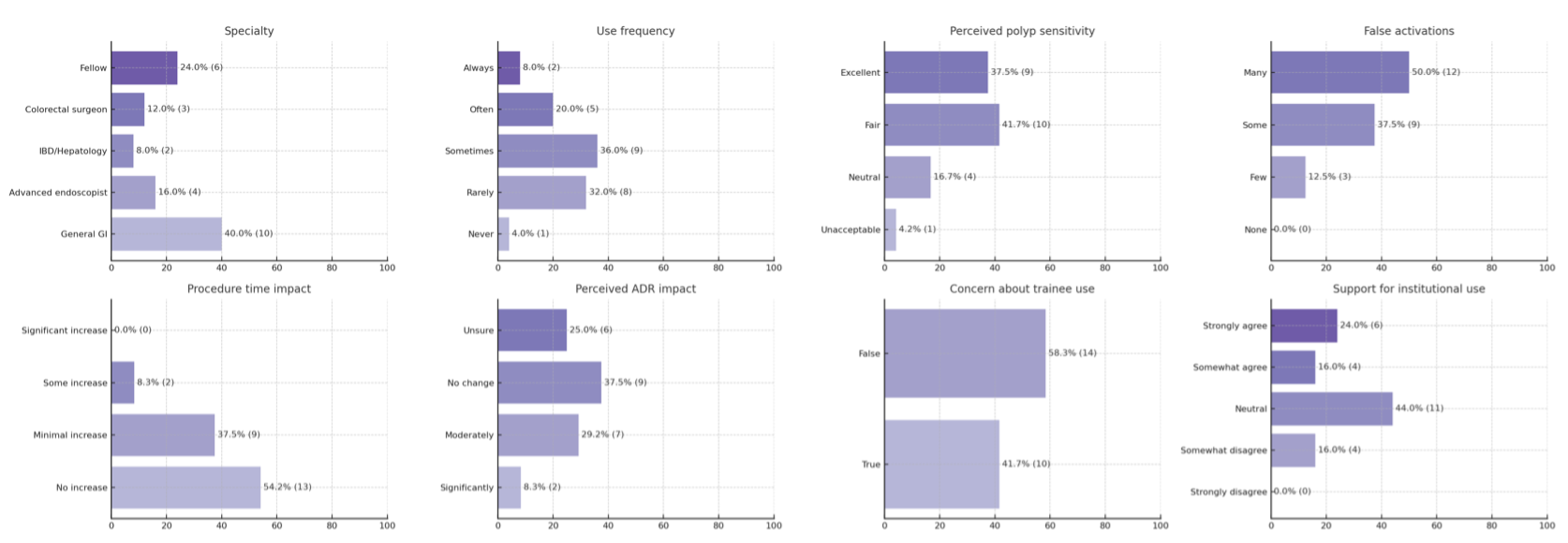Tuesday Poster Session
Category: General Endoscopy
P5136 - Real-World Provider Perspectives on GI Genius AI-Assisted Colonoscopy: A Department-Wide Survey Following Implementation
Tuesday, October 28, 2025
10:30 AM - 4:00 PM PDT
Location: Exhibit Hall

Ishan Antony, MD
Beth Israel Lahey Health
Burlington, MA
Presenting Author(s)
Ishan Antony, MD1, Joseph Cappuccio, DO2, Katherine Brunner, MD2
1Beth Israel Lahey Health, Burlington, MA; 2Lahey Hospital and Medical Center, Burlington, MA
Introduction: AI-assisted colonoscopy systems like Medtronic's GI Genius™ have demonstrated improvements in adenoma detection rate (ADR) in clinical trials. However, real-world provider feedback regarding utility, workflow integration, and impact on training remains underexplored. We surveyed endoscopists at a tertiary center to assess perceptions following one year of GI Genius™ use.
Methods: A 12-question survey was distributed to gastroenterologists, colorectal surgeons, and trainees at Lahey Hospital and Medical Center. The survey evaluated the frequency of GI Genius™ use, perceived clinical utility, ease of use, impact on ADR and procedure time, and attitudes toward trainee exposure and institutional adoption. Descriptive statistics were used to summarize findings.
Results: Of 25 respondents, 40% were general gastroenterologists, 24% fellows, 16% advanced endoscopists, 12% colorectal surgeons, and 8% from IBD or hepatology. 92% reported using GI Genius™ in the past year. Frequency of use varied, with 36% using it “often” or “always,” and 32% “rarely.” The mean usefulness rating was 6.3/10, while ease of use was rated highly at 9.0/10. Most providers (76%) rated polyp detection sensitivity as “fair” or better. However, 48% reported experiencing “many” false activations. Procedure time was reported as unchanged or minimally increased by 88% of respondents. Regarding ADR, 36% perceived improvement, 36% were unsure, and 28% noted no change. Only 16% reported patient awareness or questions about AI use. While 40% of providers expressed concern about AI interfering with trainee skill development, 40% supported institutional implementation, and 44% were neutral. Comments noted concerns about cost-effectiveness and unclear clinical value, especially from experienced endoscopists. Some cited trainee benefits; others urged clearer cost-justification before broader use.
Discussion: In this department-wide experience survey, GI Genius™ was widely adopted and rated highly for ease of use. However, provider-perceived benefit to detection rates and workflow was more mixed. While a subset reported improved ADR and endorsed institutional use, others raised concerns over false activations and potential overreliance among trainees. These findings suggest that successful AI implementation in endoscopy may hinge not only on technical performance but also on aligning expectations across experience levels, addressing training considerations, and establishing clear value-based justification for use in routine practice.

Figure: Figure 1: Distribution of responses from gastroenterology and colorectal providers on GI Genius implementation, stratified by specialty, frequency of use, perceived diagnostic utility, workflow impact, and training concerns.
Disclosures:
Ishan Antony indicated no relevant financial relationships.
Joseph Cappuccio indicated no relevant financial relationships.
Katherine Brunner indicated no relevant financial relationships.
Ishan Antony, MD1, Joseph Cappuccio, DO2, Katherine Brunner, MD2. P5136 - Real-World Provider Perspectives on GI Genius AI-Assisted Colonoscopy: A Department-Wide Survey Following Implementation, ACG 2025 Annual Scientific Meeting Abstracts. Phoenix, AZ: American College of Gastroenterology.
1Beth Israel Lahey Health, Burlington, MA; 2Lahey Hospital and Medical Center, Burlington, MA
Introduction: AI-assisted colonoscopy systems like Medtronic's GI Genius™ have demonstrated improvements in adenoma detection rate (ADR) in clinical trials. However, real-world provider feedback regarding utility, workflow integration, and impact on training remains underexplored. We surveyed endoscopists at a tertiary center to assess perceptions following one year of GI Genius™ use.
Methods: A 12-question survey was distributed to gastroenterologists, colorectal surgeons, and trainees at Lahey Hospital and Medical Center. The survey evaluated the frequency of GI Genius™ use, perceived clinical utility, ease of use, impact on ADR and procedure time, and attitudes toward trainee exposure and institutional adoption. Descriptive statistics were used to summarize findings.
Results: Of 25 respondents, 40% were general gastroenterologists, 24% fellows, 16% advanced endoscopists, 12% colorectal surgeons, and 8% from IBD or hepatology. 92% reported using GI Genius™ in the past year. Frequency of use varied, with 36% using it “often” or “always,” and 32% “rarely.” The mean usefulness rating was 6.3/10, while ease of use was rated highly at 9.0/10. Most providers (76%) rated polyp detection sensitivity as “fair” or better. However, 48% reported experiencing “many” false activations. Procedure time was reported as unchanged or minimally increased by 88% of respondents. Regarding ADR, 36% perceived improvement, 36% were unsure, and 28% noted no change. Only 16% reported patient awareness or questions about AI use. While 40% of providers expressed concern about AI interfering with trainee skill development, 40% supported institutional implementation, and 44% were neutral. Comments noted concerns about cost-effectiveness and unclear clinical value, especially from experienced endoscopists. Some cited trainee benefits; others urged clearer cost-justification before broader use.
Discussion: In this department-wide experience survey, GI Genius™ was widely adopted and rated highly for ease of use. However, provider-perceived benefit to detection rates and workflow was more mixed. While a subset reported improved ADR and endorsed institutional use, others raised concerns over false activations and potential overreliance among trainees. These findings suggest that successful AI implementation in endoscopy may hinge not only on technical performance but also on aligning expectations across experience levels, addressing training considerations, and establishing clear value-based justification for use in routine practice.

Figure: Figure 1: Distribution of responses from gastroenterology and colorectal providers on GI Genius implementation, stratified by specialty, frequency of use, perceived diagnostic utility, workflow impact, and training concerns.
Disclosures:
Ishan Antony indicated no relevant financial relationships.
Joseph Cappuccio indicated no relevant financial relationships.
Katherine Brunner indicated no relevant financial relationships.
Ishan Antony, MD1, Joseph Cappuccio, DO2, Katherine Brunner, MD2. P5136 - Real-World Provider Perspectives on GI Genius AI-Assisted Colonoscopy: A Department-Wide Survey Following Implementation, ACG 2025 Annual Scientific Meeting Abstracts. Phoenix, AZ: American College of Gastroenterology.
